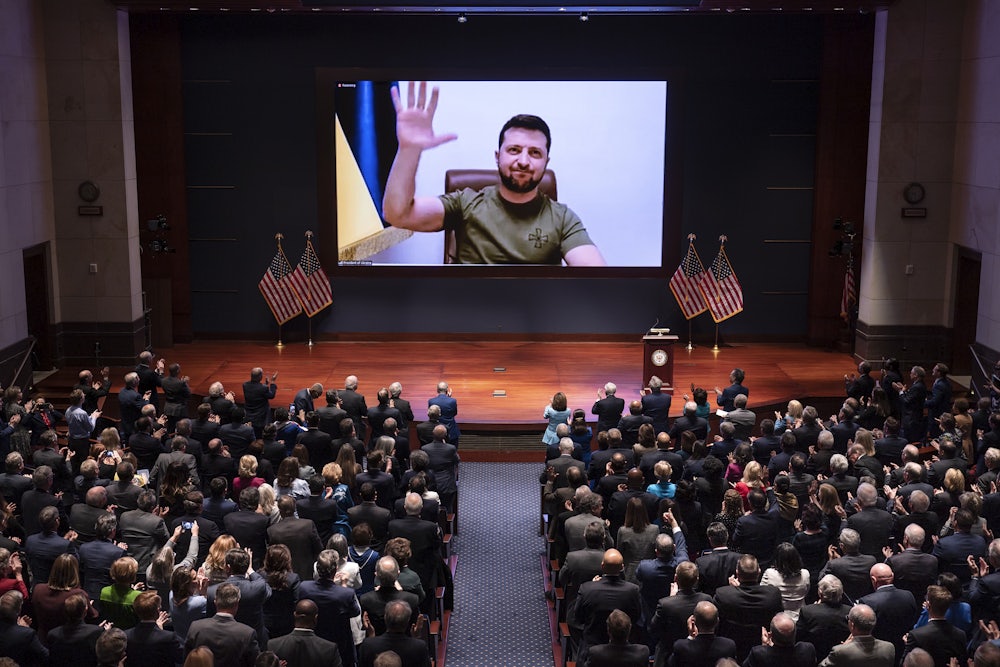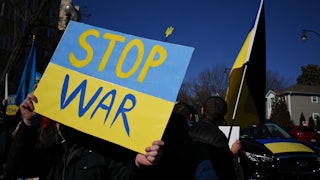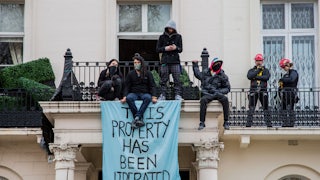Abraham Lincoln didn’t have Mathew Brady photographs when he spoke at Gettysburg. Winston Churchill didn’t show grainy World War II newsreels in 1941 when he addressed a joint session of Congress just 19 days after Pearl Harbor.
Speaking to Congress by video link Wednesday morning, 20 days after Vladimir Putin launched his merciless invasion, Ukrainian President Volodymyr Zelenskiy understood the power of visual imagery. A two-minute Ukrainian video—beginning with tourist camera shots of national landmarks and quickly morphing into a wrenching wartime montage of burning buildings and open graves—said it all. The wordless video ended with an English-language appeal: “Close the sky over Ukraine.”
Zelenskiy, in his own words, employed American history from Mount Rushmore to Martin Luther King Jr. to highlight Ukraine’s desperate need for a way to stop the Russian blitz on civilian targets. As Zelenskiy put it, “‘I have a dream.’ These words are known to each of you. Today I can say, ‘I have a need. I need to protect our sky.’”
For all the emotion embodied in Zelenskiy’s words, his tone was inevitably and unfortunately softened by the anodyne voice of the simultaneous translator. That may be why Zelenskiy, dressed in his trademark green fatigues, ended his 18-minute address in English. Invoking shelled maternity hospitals and the other horrors of wartime, Zelenskiy said, “Now I’m almost 45 years old. My age stopped when the hearts of more than 100 children stopped beating. I see no sense in life if I cannot stop the deaths.”
It takes someone far more hard-hearted than I am to hold back the tears at moments like this.
Once again, Zelenskiy reminded us that in three agonizing weeks he has become the most inspiring world leader since Nelson Mandela. It has been—to steal a line applied to another actor, Ronald Reagan—the role of a lifetime. Nothing could have prepared this comedian turned unlikely politician for the ordeal of the Russian invasion. Nothing could have prepared anyone to withstand the pummeling from a superpower—and to hold his outgunned nation together by his words, his bravery, and his force of example.
Zelenskiy will probably not get his no-fly zone since it carries the risk of NATO dogfights with Russian pilots. But there is a sense that all the hesitancy by Joe Biden to offer Ukraine nearly unlimited military aid is crumbling. In advance of the Zelenskiy speech, the Biden administration signaled that it would be granting another $800 million in security assistance to Ukraine. But that may not be enough. As Democratic Senator Richard Blumenthal, a member of the Armed Services Committee who was just in Poland, said after the Zelenskiy speech, “We have an opportunity and obligation to take more forceful action.”
What was impressive is that the Zelenskiy speech was more than just an emotional plea for NATO weapons and protection. The Ukrainian president floated the idea of a global association that he called “U-24, United for Peace.” Designed to supplant the spineless and usually ineffective United Nations, Zelenskiy envisioned “a union of responsible countries that have the strength and consciousness to stop conflicts immediately.”
This is how the idealistic founders of the United Nations in the late 1940s believed that an international organization should act when confronted with aggression. But as Joseph Stalin (who seems, more and more, like Putin’s role model) soon made clear, such a global peace force was impossible as long as the Soviet Union had a veto in the Security Council. Periodically since then, there have been proposals for an international organization of democratic nations that would extend beyond NATO and the European Union.
That, of course, is an issue for another day. But Zelenskiy seemingly had a larger point in highlighting the idea in his address to Congress. Putin’s unprovoked invasion of Ukraine offers a template for the future. Can the world ever tolerate the takeover of independent democratic nations by nuclear powers? Unless Putin is stopped—and Russian forces endure a humiliating withdrawal from much of Ukrainian territory—he will be tempted to strike again in his fantasies of restoring the glories of the Soviet Union.
In the Gettysburg Address, Lincoln said with modesty, “The world will little note, nor long remember what we say here, but it can never forget what they did here.” Zelenskiy’s words to Congress and the video that accompanied them may be long remembered. But what also must remain unforgettable is what the Ukrainian armed forces—and the aroused citizens who bravely support them—will do in the harrowing weeks ahead with American and NATO weapons.






